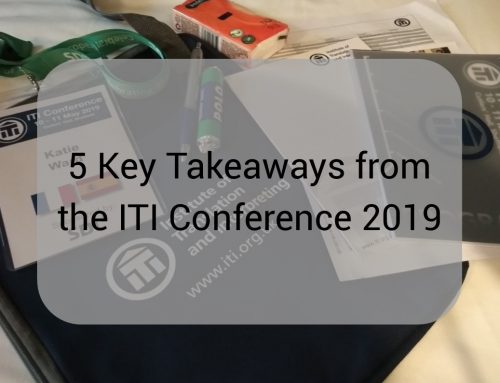Before applying to the University of Portsmouth’s distance-learning MA in Translation Studies, I remember trying to find reviews and comments from previous students to understand more about what the course was really like and being unable to find much. Having now completed the course, I decided to write this review in the hope that it will be useful to other prospective students.

Flexibility
One of the key advantages of this course is the fact that it is distance learning (although there is a campus-based version too). As such, it is incredibly flexible. This particularly appealed to me since I was able to move back home with my parents and work part-time alongside the course.
The MA Translation Studies course at the University of Portsmouth has been running since 1997, and through distance learning since 2007. Both degrees share the same programme, so it has the benefit of being well-established.
Most of the modules involve weekly contributions to the forums, sometimes as part of a group. However, although they highly recommend doing these, they are not essential or formally assessed. They also do not have to be done at a certain time or day during the week. This means that if one week you are especially busy and miss contributing, you do not have to worry that this will negatively affect your grades, and you can always catch up the next week.
Like most university courses, it also has a relatively short term time. This means that you can use the long breaks productively. For example, by doing an internship.
There are also three possible exit qualifications, based on one, two or three years of study:
- MA in Translation Studies (one core unit, two optional and the dissertation): 180 credits
- Postgraduate Diploma in Translation Studies: 120 credits
- Postgraduate Certificate in Translation Studies: 60 credits.
Course content and evaluations
The course is delivered through the university’s Virtual Learning Environment (VLE), Moodle. I found this easy to use and never encountered any problems with it. Having said that, some people had access issues at the start of the year when they weren’t assigned to the correct modules.
When I did the course, there were two compulsory modules plus the dissertation. You then chose two optional modules on top of those.
First year
In the first year of the course, you do the two compulsory modules. These were ‘Theory and Practice of Translation’ and ‘Specialised Translation’.
I found the theory module informative, if a little dry, but I imagine this would be the case in other courses too. ‘Specialised Translation’ was a much more practical module and mostly involved group work. We focused on a different specialism in each teaching block, so there were four specialisms in total. In the French module, these were technical, crime fiction, legal and financial.
During the weekly group work, we worked both into and out of English. This was good for improving or keeping up source-language skills. However, it seemed a little irrelevant since we are always told that, professionally, we should only translate into our native languages.
My only other criticism of the ‘Specialised Translation’ module would be that you weren’t able to choose which specialisms you studied. Having said that, it’s good to get an overview of the specialisms that are out there. This is especially true if don’t yet know which you might like to focus on in your future career.
Second year
In the second year, I chose to do ‘Second Specialised Translation’ and ‘Translation Technologies’. ‘Second Specialised Translation’ was the same as ‘Specialised Translation’ but in a second language. In my case, this was Spanish. The specialisms we studied in the Spanish module were journalistic and cultural, instruction manuals, and technical, medical and legal.
‘Translation Technologies’ involved two teaching blocks, one which focused on machine translation, glossaries and concordancers, and one which focused on subtitling. This was a very practical module and was probably my favourite.
Final year
The final year of the course was dedicated entirely to the dissertation, enabling you to really focus on it. There were two types of dissertation that you could choose from: a translation and commentary or an empirical/critical essay. To begin with, there were group discussions about ideas and plans and some information about research methods. Following that, it was all individual work, plus ten hours of tutorial support. Supervisors were allocated based on the language pairs and/or topic of the dissertation. The dissertation proposal of 1000 words made up 10% of the final mark for the module. The dissertation itself made up the remaining 90% of the mark.
I had to submit the majority of assessments across all modules via Turnitin, and tutors returned detailed feedback within about a month. The dissertation was the only module in which I had to submit printed copies and feedback took longer.
Other modules that were available to me were ‘Independent Learning’, ‘Professional Aspects of Translation’, ‘Technical Writing for Translators’, ‘Translation Project’. In hindsight, the ‘Professional Aspects of Translation’ module would have been a good option to take since we were given little information on the business side of being a translator in the other modules. Having said that, there were ‘Engaging with the Profession’ seminars and other resources available online. As well as that, the university hosts an annual translation conference, which is a great opportunity to get to know more about the profession and to network.
Languages
A further benefit of the course is the wide range of languages that you can study. These are currently Arabic, Chinese, French, German, Italian, Japanese, Polish, Russian or Spanish. You are also able to choose two language pairs. The course is open to students working both into and out of English. This means that there are students from all over the world on the course, creating a vibrant virtual community.
The university provides support for students whose first language is not English with classes in English for Academic Purposes (EAP). These classes are free to all international/EU students.
Tutors
I could not fault the tutors on this course; they are all so knowledgeable and passionate about the subject. They were also friendly, approachable and supportive. In terms of communication, they were all very easy to get in contact with and quick to respond to any emails. In the dissertation module, there was also the opportunity to arrange Skype tutorials.
Library
I found the library service at Portsmouth to be fantastic! The faculty has a dedicated librarian who was always very helpful. She often sent emails and appeared on the forums to give tips, advice and solutions to problems, even when the question wasn’t aimed at her.
The online library services are great and easy to use; I was always able to find what I needed. The library also has additional services and advice especially for distance learners. This means that you don’t miss out by not being on campus. For example, if a journal article or book is not available online but is available in the library, you can request a copy of the article or a chapter of the book to be scanned and emailed to you. If you live in the UK and Ireland, you can also request books that are available in the library to be posted to you.
Another service that you can make use of if you live in the UK is SCONUL Access. This is a scheme that allows you to borrow or use books and journals from other university libraries that are located nearer to you. The University’s Academic Skills Unit (ASK) also provides support specifically for distance learners.
The referencing style used by the department is APA 6th edition. I used a different style in my undergraduate degree, but I found APA easy to get used to, especially thanks to the online resources and guides provided by the library. The faculty librarian also helped with any specific referencing queries.
Career prospects
When I began looking for an MA to study, being part of the European Master’s in Translation Network (EMT) was my main criteria. EMT is a network run by the Directorate-General for Translation at the European Commission. It awards a quality label to MA university programmes in translation that meet agreed professional standards and market demands. You can find out more about this here.
Both the campus and distance-learning courses at the University of Portsmouth used to be members of the EMT network, but unfortunately due to the UK leaving the EU, there are no longer any courses in the UK in the EMT network. However, the University is a member of a number of other professional networks, such as the Institute of Translators and Interpreters (ITI).
There is a dedicated area for advertising jobs, internships and volunteering on the Moodle site, which is updated regularly. Also, when staff are contacted with opportunities, they forward the emails to all students.
The careers service at the University of Portsmouth, Purple Door, is a great resource that you can access for five years after graduation. There is an online jobs board, as well as advice and resources. They also run events and workshops that you can attend if you are able to travel there.
Conclusion
Overall, I found the course to be very useful, especially for improving and gaining confidence in my translation and research skills. I would recommend the course to others, especially if flexibility is important to you. The large combination of languages is also a plus for people with rarer language pairs.
The course is primarily aimed at language graduates or graduates from another discipline who have advanced language skills. However, it is also ideal for already practising translators who would like a postgraduate qualification for professional recognition.
Deadlines to apply are the 31st of July if you are applying to start in September, or the 1st of December if you are applying to start in January.
Some information may have changed since I finished the course in 2017 or since I have written this, so you can find up-to-date details about the course here.






thanks a lot Katie! This was very informative. I already have MA in Education, but have been in the translation and localisation industry for 20 years now. And – believe it or not – I was rather inclined towards taking up MBA, as I have good opportunities here for doctoral and post-doctoral studies. But, with translation being my first and greatest love, now you have planted a seed of doubt in my mind. I might just go with this course :). Thanks again for your contribution!
Thanks Ivana, I’m really glad that you found it helpful!
Thanks for this nice review. The modules are specific for each pair or just general and do they really combine between theoretical and practical like the site says?
You’re welcome! The specialised translation modules were specific to each language (e.g. FR>EN and EN>FR together), but I think the rest of the modules were all mixed. Yes, I found there was a good balance of theoretical and practical work.
Thanks for replying. Don’t you think three years (Part time) is long for a program like this one? Comparison to other universities who have almost the same program. Final question, Do you think this course or program could give someone who has good experience in this field but don’t have any credentials a real push to his career and make him a licensed translator who could pursue in-house positions and up to date knowledge about the industry or it is just informative and intellectual one, which could give good idea about the industry but not more than that, so you need to follow other programs and learning (which I’m afraid of)? I know the site could give me answer about the last question but I want an insight from a student.
Thank you,
No problem! I think that’s really up to you to decide! Personally, I found that it went quickly. I liked the pace of it because it meant I could work at the same time but still be able to dedicate enough time to the course. The course will certainly give you a good theoretical base, and I’m sure you will still learn things despite your experience. Also, as you say, it’s a good credential to have when applying for jobs, whether in-house or freelance, and it could allow you to increase your rates. As for industry knowledge, I think it depends on the modules you take. For example, the professional aspects of translation or professional portfolio would probably be good for this.
Thank you 🙂
Thanks for this review. I’m currently looking at an online translation MA, and I’m torn between Bristol and Portsmouth. May I ask, but does the degree certificate have (DL) mentioned on it for Portsmouth?
Hi Chris, thanks for reading! No, the degree certificate does not mention DL and the DL course follows the same programme as the campus-based course.
Just to add, it does mention DL on the transcript, but not on the actual certificate.
Hi Katie. Thanks for taking the time to reply. I like the look of the Portsmouth course, and I have been offered an unconditional place for this year. I am keeping other courses in mind, however, as I was originally planning to do a course in a year but costs are prohibitive and Portsmouth’s course is much more manageable in this respect. Like you, I’ve been looking for information. I’m slightly bothered about something I read about the translation modules in that they are peer reviewed rather than tutor taught. Can you offer any information on that at all? I’d rather have tutor guidance. Does the MA also allow for merits and distinctions? I hope you don’t mind all my questions.
Hi Chris, no problem! The translation modules were tutor taught when I did the course, but I suppose it’s possible that it has changed, you might be best emailing the department if you want to be sure. When I did the course, there was some group work in which we did do peer review but there was always input and a final review by the tutor. I actually found the peer review really useful since you get a range of different views. Yes, the MA does allow for merits and distinctions.
Can I ask you some questions about your Distance learning experience with Portsmouth? Were the classes easy or difficult? Did they consume a lot of time? How was the cost?
Thank you!
Sincerely,
Sun Lee
Hi Sun Lee,
The classes were definitely a noticeable step-up from my BA, but not too difficult! It’s hard to say how much time I actually spent on it, especially since it varied from week to week depending on the tasks and assessments that we had to do. Having said that, I think I remember that they recommend spending 10-15 hours per week per unit. The cost changes each year, you can find the up-to-date amount on the course website: https://www.port.ac.uk/study/courses/ma-translation-studies.
Kind regards,
Katie
I’ve recently been having thoughts about the cost of the course too and I’ve contacted the university so I thought my experience might be of interest here. I noticed that, for last year’s intake, the fees were £1730. They do state that fees are subject to increase so one would expect a slight increase year by year. For this year’s intake, the fees are £2170. If my maths is right, that’s a 25.4% increase which is, in my opinion, a lot to pay for a distance course. A distance course is never going to be as good as attending a university. In fact, in my field some institutions reject distance MAs as standard practice. Part of the attraction of Portsmouth’s course is the reasonable fees, but it appears they are now starting to get greedy, which is unfortunate because the course does look good and I’ve had very positive experiences regarding contact with the postgraduate office and the department. This is more than I can say for the fees office! I contacted the department about the huge increase in fees to ask them if it was likely to continue year by year, and was referred to the fees office. The response I received from the fees office was, to put it kindly, less than satisfactory as it did not address the question I asked. I have requested a follow up but apparently it will take up to 5 working days to respond. I can accept the fees at £2170 with a slight increase per year, but if you project a 25.4% increase on fees over three years, and again if I’ve got my sums right, you end up with a total cost of £8303, which is more expensive than any translation course I’ve come across in the UK outside London. I had pretty much decided on Portsmouth but this changes things. I will post a follow-up to this if I receive a satisfactory response from the fees office.
Thanks for the information, Chris. That does seem like a big increase, but unfortunately it seems to be a nationwide trend, possibly linked to the introduction of postgraduate loans.
Hello,
You mention that you dedicated about 10 to 15 hours of study per week. However, I emailed one of the instructor and he said it takes about 6 to 10 yrs per week? Why the difference of opinion?
Hello Oscar,
I actually didn’t say how long I dedicated to study each week because it’s difficult to say since it tended to vary depending on the tasks/modules. I did mention that I thought I had remembered them recommending spending 10-15 hours per unit per week on it, but I may have remembered wrong! Also, I finished the course in 2017, so it’s possible that the recommendation has now changed. If it helps to know, I worked a part-time job of around 25 hours per week at the same time as doing the MA. However, I think it also depends on the individual, for example, I made my own notes on everything we had to read and did extra reading around the subject, so it probably could have been done in less time. Hope that answers your question!
Also, how long is a teaching block? 12 weeks? 15?
Thanks
The teaching blocks were 12 weeks when I did the course, but I would recommend checking this with the university as it may have changed since then.
Thanks for the answer! I checked the website and the Fall block is 12 weeks while the Spring block is 15 weeks.
I’ll email a different instructor to clarify the required hours of study per week. I work full time and don’t want to set myself up for failure. But the fact that he said 6 to 10 hours is reassuring. Thanks
You’re welcome! Hope it goes well if you go ahead with it!
Hello again!
What are some of the textbooks required for the courses (especially for the Theory and Practice of Translation)? Or is the reading material provided by the instructors? What are some of the titles of books you had to read.
Thanks.
Hello, I can’t remember for sure and they may have changed anyway, however, the majority were available electronically through the library. I think I only had to buy one book, which was for the Translation Technologies unit. If you wanted to get a head start, books by Mona Baker, Anthony Pym, Jeremy Munday and Lawrence Venuti are probably a good bet. Hope that helps!
Thanks! It helps tremendously. Yes, I wanted to start reading in advance. I have Mona Baker’s In Other Words and Munday’s Translation, an advanced resource book.
One last question, please. I apologise for bothering you so much, but it’s important.
In their website, it says that the teaching block ends in mid December, then you get a 2 week Christmas break, then in January you get 2 weeks for tests and final assessments. Does that apply for distance learning as well or only in person?
I’m planning a trip in December, but may have to postpone if I have to take tests in the first part of January.
No problem! In the distance learning course there were no exams/tests, just assessments, these included essays, dossiers and recorded presentations. When you start the course, you will receive the course and unit handbooks, which will have all the important dates in. When I did the course, there were three assessments in the Theory and Practice unit and they were due in week 12 of the autumn teaching block, in week 9 of the spring teaching block and at the start of May. In the Specialised Translation unit there were four assessments, these were set in week 4 and due in week 6 and set in week 10 and due in week 12 of each teaching block. Might be best to check with the uni for up-to-date information though.
Hi Katie, thank your for your review – I have found it invaluable! I intend to apply for MA Translation Studies at Portsmouth Uni for the exact same reasons as you had – EMT accreditation and full flexibility a distance learning course offers. On top of that, I live 150 miles from this uni (and any uni that offers my language pair, in fact!) and am a bit reluctant to move any closer to it due to Covid-19 uncertainty. At the same time, however, I am slightly worried I might find it an isolating experience or it would simply take a bit too long to complete the course. Are you able to offer some advice here? Do you know if there is a possibility to do it any faster online or attend some classes/modules on-campus? I also wonder how many contact hours a week you had? Do you know, by any chance, how it compares to their part-time on-campus equivalent? Did your online classes offer a real-time interaction – and was it with other distance learning students or/and students on campus? I would greatly appreciate any advice regarding above issues… either way, I am minded to apply for a September 2020 start and am grateful for the re-assurance and encouragement your review offered – again, many many thanks! Kind regards 🙂
Hi Magdalena,
You’re welcome, I’m glad it reassured and encouraged you! I was also concerned that three years seemed like a long time, but it went very quickly. As far as I’m aware, there isn’t the possibility to do it any faster or attend some classes on campus, but you could always enquire with the university. Personally, I didn’t find it isolating at all, you do a lot of work with others on forums and there are also social forums. I believe the distance-learning MA follows the same programme as the part-time on-campus equivalent. The majority of the interaction was through forums, so not “real-time” as such because there were people from all over the world, so others wouldn’t always be online at the same time as you. I’m fairly sure we were just with other distance-learning students. Best of luck with your application!
Kind regards,
Katie
Dear Katie,
your post is a godsend! Like other readers, I too am looking for a course which is EMT-recognised, with a practical approach, offered by distance learning, with two foreign languages, and my choice fell on Portsmouth’s MA in Translation Studies. I am a little confused about the possibility to complete the MA in one year vs. three years. Can you please clarify whether you are given the choice? Or is the distance MA only offered over three years?
My second question is about the module description: I have been browsing the University’s page (https://www.port.ac.uk/study/courses/ma-translation-studies) and I cannot find a course structure. How do I pick the optional modules? Just by their name? Thank you in advance.
I’m pleased you found it useful! When I did the course, you could only do the distance-learning course part-time over three years, but it looks like you can now do it full-time in one year. You can find out more about the modules and course structure here: https://register.port.ac.uk/ords/f?p=111:1:::::: Hope that helps!
Hi Katie, Thanks for the review. I am planning to enroll myself for the same course. But the only thing is I am planning to pursue 2 Master’s Degree simultaneously. One from a regular university ( Masters in German) and the second degree will be MA translation distance learning. Is it ok if I pursue 2 masters degree simultaneously?
Thank you.
Hi Saloni,
You’re welcome! I don’t know, you would need to check with the universities, but I imagine you would really struggle to keep up with the work for two MAs!